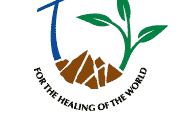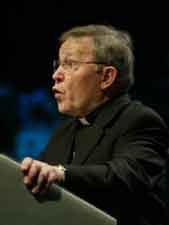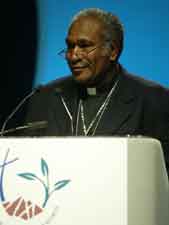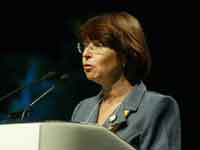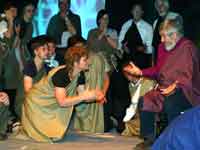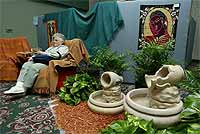






|
At
the Assembly Day 4 - Thursday 24 July
Walter Cardinal Kasper, President of the Pontifical Council for Promoting Christian Unity (PCPCU), told participants in the LWF Tenth Assembly that spiritual ecumenism is the answer to healing the wounds of the world. In his official greeting to the Assembly, Kasper asserted that "without spirituality, the ecumenical movement becomes merely an academic affair, where 'normal' Christians cannot follow, where they feel excluded and finally frustrated; or it becomes a soulless activism, the business of an endless series of conferences, symposiums, gatherings, meetings and ever-new documents which nobody can read." > Click here
for complete story.
Bishop Dr Wesley Kigasung, delegate from the Evangelical Lutheran Church of Papua New Guinea, reinforced keynote speaker Bishop Margot Kässmann’s theme of the authority of scripture, sola scriptura. He asked the Assembly participants to "listen again" to the earliest accounts in Genesis of the wounding of creation, when God asked of Adam, "Where are you?" and of Cain, "Where is your brother?" The bishop said that the human avoidance of responsibility did not change God’s "good and holy intent" for creation. Echoing Kässmann’s words, he said that these stories challenge us to respond to our brothers and sisters "with eyes wide open" to the call to accountability implicit in God’s questions.
Ms Virginia Ivañez de Neyeloff, delegate from the Evangelical Lutheran Church in Venezuela, reacted to Bishop Kässmann’s address from the concrete, regional context of Latin America, where men and especially women feel "the pain of injustice, corruption and unnecessary death." She reviewed the historical perspective in which indigenous cultures that once had their own sophisticated links to nature were then enslaved and exploited by European conquerors and were force-fed a new religion. > Click here for complete story.
In the day’s Bible study presentation under the theme "Forgive and Heal", Assembly participants from the Central and Western European Region acted out in silence the story of Jesus and the woman "who was a sinner" (Luke 7:36-50). The dramatic pantomime depicted the meeting between Jesus and the woman who washed Jesus’ feet with ointment and her own tears. > Click here for complete story.
The schedule for many days of the Assembly includes plenary sessions, discussions, Bible studies and Village Group meetings. Delegates and other participants welcome the opportunity to pause now and then in the middle of the hectic schedule. "Miriam’s Well" is the place to do just that: to relax, rest and talk together; to enjoy refreshments or a massage; or perhaps just to find quiet in the midst of busy activities.
[Site Map] [LWF Assembly Home] [Links] [LWF Home] |
